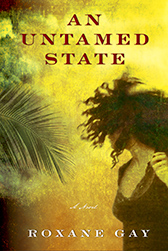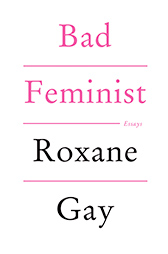Subscriber Benefit
As a subscriber you can listen to articles at work, in the car, or while you work out. Subscribe Now“I was not broken. That is what I tell myself.”
So states the heroine in Roxane Gay’s “An Untamed State” (Grove/Atlantic), her harrowing first novel, published in May just ahead of the August release of Gay’s essay collection “Bad Feminist” (Harper). Together, they send a clear message that the new Purdue University assistant professor is already one of the state’s leading literary lights.
But don’t let the academic credentials fool you. Gay’s writing is as accessible as it is sharp.
In the volume of essays, Gay mixes the personal, the political and the pop cultural with unashamed acknowledgement that the three are interrelated and often inseparable.
 Gay
GayShe starts off (relatively) lightly, with pieces about teaching and about playing competitive Scrabble. Solid and engaging enough, they nonetheless had me anticipating more meat to come. Which it did.
It’s easy to reduce her essays on such subjects as “The Help,” “Fifty Shades of Gray” and comedian Daniel Tosh to her pithiest quotes. And she’s very good at constructing a memorable line. She calls “Fifty Shades” “… a detailed primer for how to successfully engage in a controlling, abusive relationship” while the song “Blurred Lines” “… revisits the age-old belief that sometimes when a woman says no she really means yes.” But Gay’s book is richer than that, filled with smart, searching opinions.
Gay isn’t afraid to be personal in the book, whether writing about her own traumatic sexual assault or just admitting that her thoughts about a given subject can be contradictory. And her tone is refreshing and even embracing.


True to the book’s title, her viewpoint is clearly in the feminist camp (“… if a woman does not want to be a feminist, that is her right, but it is still my responsibility to fight for her rights.”). The “bad” comes from her knowledge that she doesn’t fit the checklist society has placed on the term. She admits, for instance, to being horrified by some hip-hop lyrics while embracing the music itself. She has an astute understanding of the impact of the relentless sexual violence in “Law & Order: SVU” while continuing to watch. And she likes the color pink.
“I want to be independent,” she writes, “but I want to be taken care of and have someone to come home to. … I want to be strong and professional, but I resent how hard I have to work to be taken seriously… .”
It’s hard to imagine anyone reading “Bad Feminist” or “An Untamed State” and not taking Gay seriously.
“An Untamed State” begins with a kidnapping. Mireille Duval Jameson
has returned from the United States with her husband and infant to visit her Haitian parents. In the kidnapping capital of the world, she is a prime target. Complicating matters is her father’s refusal to give in to the demands of the criminals, putting his own daughter’s safety aside for, in his view, the greater good. He sees his refusal to pay as protecting others who might be kidnapped because of his compliance.
Gay gives the father a fair hearing—and doesn’t shy away from the economic disparity that fuels the danger in Haiti—but she doesn’t let that mitigate the horror perpetrated on Mireille. She never lets the suffering of women be “used to further a man’s narrative” (as she accuses the movie “12 Years a Slave” of doing in one of her essays). The result is often difficult to read, but a rape narrative shouldn’t be easy to read.
I have not read many such stories. I don’t watch “SVU,” and I don’t usually read books that focus on horrific trauma of any kind. But from my limited perspective, the uniqueness of “An Untamed State” comes from Gay’s handling of the after-effects—Mireille’s life once she is, allegedly, safe.
Gay makes clear (even when it’s cloudy), about the complexity of the after effects of rape—that it isn’t a straight line. That forgetting isn’t an option. That surviving is not a moment but an ongoing reality.•
__________
This column appears weekly. Send information on upcoming arts and entertainment events to [email protected].
Please enable JavaScript to view this content.
